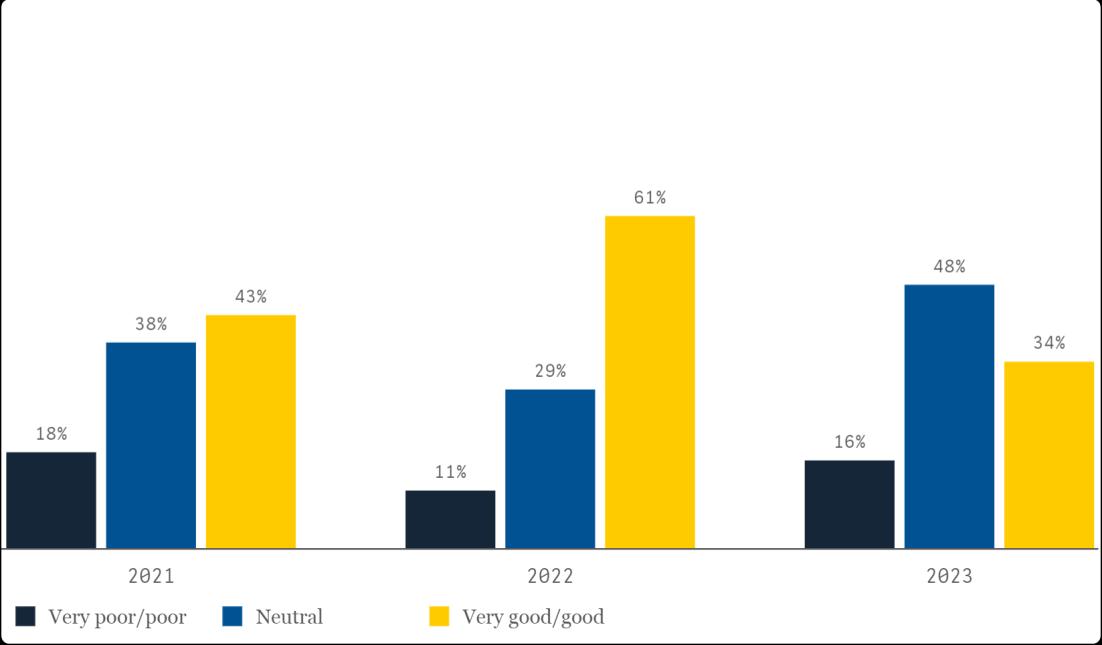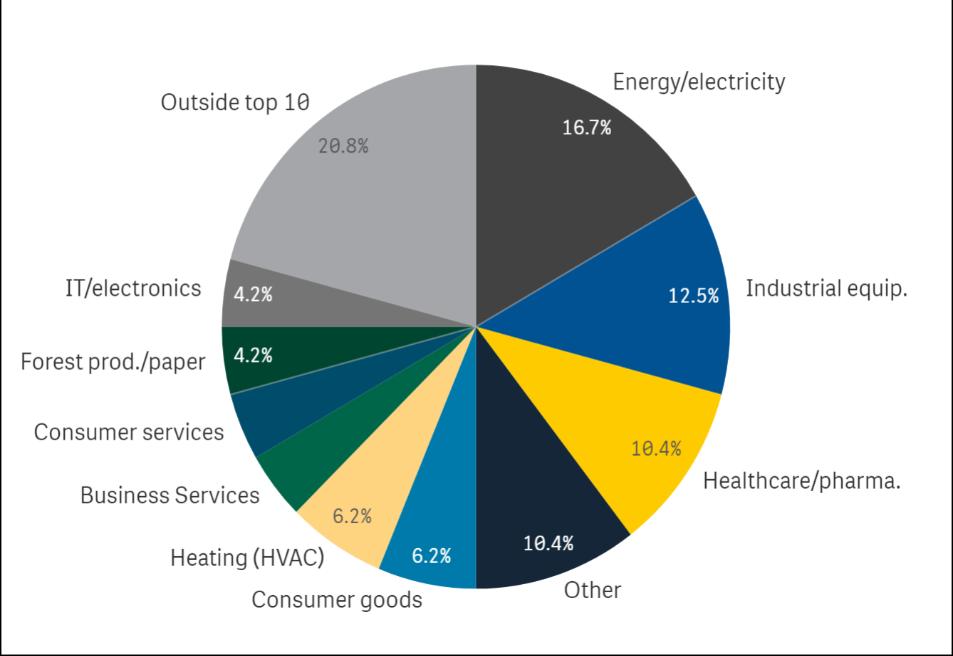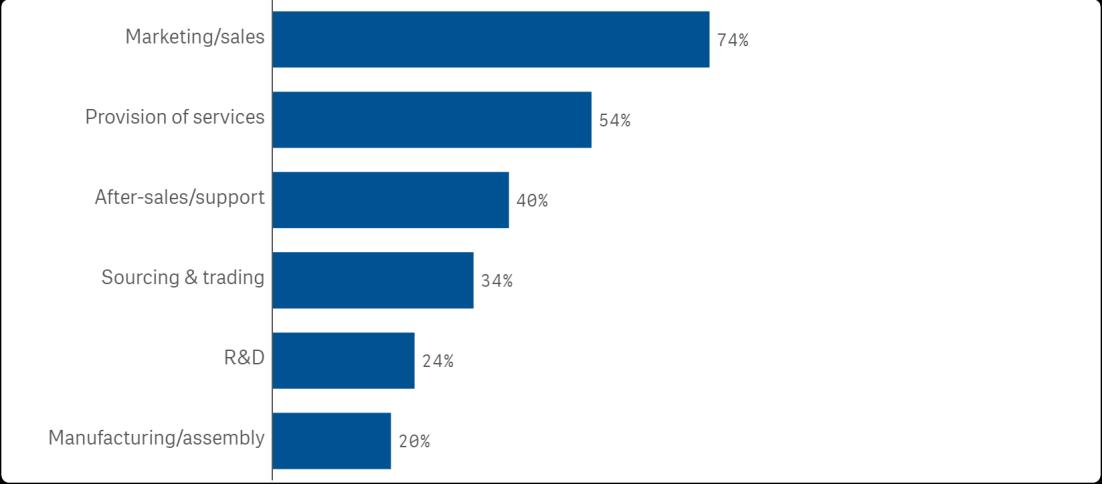
3 minute read
Swedish companies find personal safety and the strength of service provision particularly favourable in the United Kingdom
There is a plethora of factors that determine whether the business environment in a particular market is conducive to success for businesses. Our survey asked Swedish companies to evaluate the extent to which certain factors met their needs in the UK market. When evaluating the UK market conditions, participants’ results were broadly positive, with no category receiving an overall negative response, indicating that Swedish companies are overall of the opinion that their business needs are being met by the UK market. On average, respondents gave the highest score to personal safety and service providers. This was closely followed by suppliers, distributors, and work culture/business mindset.
However, our findings show us that there are some market conditions that the UK is not providing as successfully, namely the strength of physical infrastructure, corporate taxation and customs, licenses, permits and approvals. Our results indicate that Swedish businesses hold diminished confidence regarding their regulatory affairs when doing business in the United Kingdom. It is highly possible that Swedish businesses have been negatively impacted by the realignment of the United Kingdom’s relationship with the European Union since 2016. One respondent to our survey points to ‘a sense of complexity’ when conducting business in the United Kingdom post-Brexit. Another respondent describes lead times having ‘increased substantially due to customs bureaucracy’.
Advertisement
Moreover, respondents have ranked the level of digitalisation as the UK market condition that meets the needs of their businesses lower in 2023 than in 2022. Sweden is a frontrunner globally regarding digital connectivity and integration of digital technologies into a multitude of areas. According to the International Institute for Management Development’s World Digital Competitiveness Ranking 2022, Sweden was ranked 3rd behind only Denmark and the United States. In comparison, the United Kingdom placed only 16th , having fallen two places since the previous year’s report. Furthermore, when considering the countries’ digital readiness, Sweden far outranks the UK in technology adoption, technology infrastructure and government investment levels. Given Swedish companies’ digital expertise, it is not surprising that they enter the UK with high expectations of existing digital infrastructure and thus are challenged by the UK digital market conditions.
One category that has improved in this year’s Business Climate Survey in the view of Swedish businesses is the strength of specialists and key personnel. We envisage that this indicator will continue to improve as the United Kingdom has invested widely in several key industries to enhance the strength of research, development, and specialisation within these areas. An example of this is the unveiling of a package worth £650 million introduced by the Chancellor of the Exchequer on 25th May 2023 for the life sciences sector. This investment seeks to ‘support economic growth with new commitments and funding for manufacturing, skills and infrastructure’ including particular emphasis on the improvement of clinical trials.
HOW WELL DO THE FOLLOWING CONDITIONS MEET THE NEEDS OF YOUR COMPANY IN THE UNITED KINGDOM?
NOTE: The number of respondents for this question was 50
SOURCE: Business Climate Survey for Swedish Companies in the United Kingdom in 2023
Trade barriers in the UK are broadly limited and mainly concentrated around custom procedures
Conducting business within the UK is not exempt from challenges. The most significant area of difficulty reported was customs procedures: Swedish companies struggle with clarity on customs procedures and customs duties as well as regulations. This sentiment was particularly prevalent amongst consumer-based businesses, 67 per cent of whom reported that regulations and customs procedures had resulted in a noticeably negative impact on their operations. One respondent noted that customs barriers have made them cease using the UK as a hub for sales and shipment as well as service and support as a vehicle to conduct business in Ireland. Other respondents have pointed to ‘substantial additional paperwork’, ‘complexity of selling equipment’ in Northern Ireland and delays around work permits for EU staff as further issues that they have encountered.
These issues show that many Swedish companies conducting business in the United Kingdom could benefit from greater clarity and guidance regarding trade barriers post-Brexit to quell additional bureaucracy and longer lead times.
HAS YOUR COMPANY IN THE PAST YEAR ENCOUNTERED TRADE BARRIERS IN THE UNITED KINGDOM WITH A NOTICEABLY NEGATIVE IMPACT ON OPERATIONS, IN ANY OF THE FOLLOWING AREAS?

NOTE: The number of respondents for this question was 50
SOURCE: Business Climate Survey for Swedish Companies in the United Kingdom in 2023









